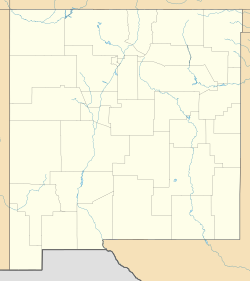The Art Annex is a historic building on the campus of the University of New Mexico in Albuquerque, New Mexico. Built in 1926, it originally served as the university's library. The building was designed by Trost & Trost and Elson H. Norris and features a Mayan-influenced hybrid form of Pueblo Revival architecture. It was listed in the New Mexico State Register of Cultural Properties in 1975 and the National Register of Historic Places in 1988.[3]
Art Annex | |
 Art Annex, May 2010 | |
| Location | 1901 Central Ave. NE[2] Albuquerque, New Mexico |
|---|---|
| Coordinates | 35°04′53″N 106°37′29″W / 35.08139°N 106.62472°W |
| Built | 1926 |
| Architect | Trost & Trost Elson H. Norris |
| Architectural style | Pueblo Revival |
| NRHP reference No. | 88001540[1] |
| NMSRCP No. | 417[3] |
| Significant dates | |
| Added to NRHP | September 22, 1988 |
| Designated NMSRCP | October 31, 1975 |
History
editThe university's library collection was originally housed in Hodgin Hall, but had outgrown that space by the 1920s. A new, dedicated library building was constructed on the site of Hadley Hall, an earlier university building that burned down in 1910. The new library was designed by the El Paso firm of Trost & Trost in collaboration with local architect Elson H. Norris[4] and was completed in 1926 at a cost of $42,000.[5] However, the library collection continued to grow rapidly and exceeded the capacity of the building after only a few years. In 1938 the new, much larger Zimmerman Library was completed, and the old library was remodeled into classroom and studio space using Works Progress Administration funding. The building was remodeled again in 1984–5, and currently houses graduate studios for Master of Fine Arts candidates in painting, photography, printmaking, and experimental art and technology.[4]
Architecture
editThe Art Annex is a single story (with basement), flat-roofed building of brick bearing wall construction. Built during a transitional period in UNM's architectural history, it incorporates elements from a number of different styles including Pueblo Revival, Beaux-Arts, modernist, and Mayan. The building features a symmetrical, classically organized facade with banks of tall hopper windows to supply light to the interior reading areas. The strongly battered exterior walls are stuccoed and decorated with stylized vigas and other simple geometric elements. The original plans also included a curvilinear Mission style parapet which was never built.[4]
References
edit- ^ "National Register Information System". National Register of Historic Places. National Park Service. March 13, 2009.
- ^ "UNM Building List by Campus, by Building Name" (PDF). University of New Mexico. Archived from the original (PDF) on 28 January 2013. Retrieved 10 November 2013.
- ^ a b "Listed State and National Register Properties" (PDF). New Mexico Historic Preservation Commission. Archived from the original (PDF) on 25 April 2015. Retrieved 20 October 2013.
- ^ a b c "Historic Cultural Properties Inventory Forms" (PDF). UNM Getty Campus Heritage Project. University of New Mexico. Archived from the original (PDF) on 29 October 2013. Retrieved 27 October 2013.
- ^ Hooker, Van Dorn (2000). Only in New Mexico: An Architectural History of the University of New Mexico. Albuquerque: UNM Press. p. 312. ISBN 0826321356.
External links
editMedia related to Art Annex at Wikimedia Commons

